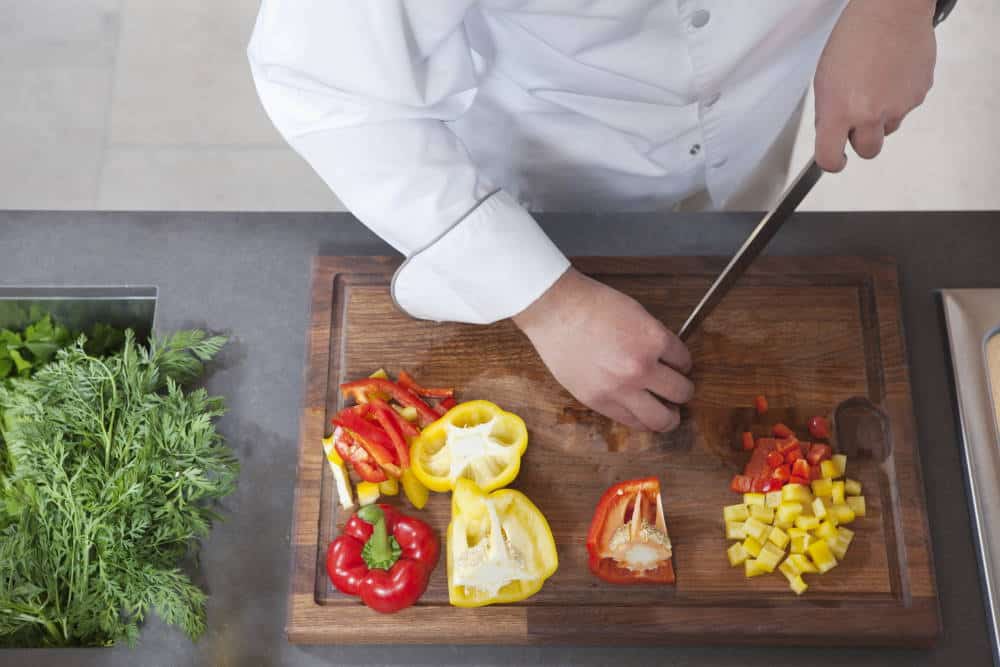Solving the Smelly Mystery: Why Does My Wood Cutting Board Smell?
Written By James Morgan
As barbecue enthusiasts, you know that a reliable wood cutting board is an essential part of your kitchen toolkit. But what do you do when your trusty board starts to emit an unpleasant smell? This common issue can perplex even the most seasoned grill masters, leading them to wonder why their wood cutting board smells and how they can manage it effectively.
Understanding the reasons behind the odor and learning how to maintain your wooden cutting board can save you from having to replace it frequently. Here, we delve into the causes of the smell and how to rectify and prevent it, ensuring your cutting board remains a trusty accessory for your barbecuing escapades.

Common Causes of a Smelly Wood Cutting Board
Bacterial Growth
One of the primary reasons why your wood cutting board smells is bacterial growth. When food particles get trapped in the tiny crevices and cracks of the wood, it becomes a breeding ground for bacteria. This is particularly problematic when cutting raw meat, which can introduce harmful bacteria like Salmonella or E. coli.
Moisture Retention
Wood is a porous material, meaning it can absorb and retain moisture. Persistent moisture can result in mildew and mold growth, contributing significantly to unpleasant odors. After washing, not drying your cutting board thoroughly can warrant the growth of these organisms.
Improper Cleaning Practices
Many barbecue enthusiasts tend to think that rinsing with water is enough to clean their wooden cutting boards. However, doing so can leave behind food particles, oils, and bacteria, which will lead to nasty smells over time.

Steps to Eliminate the Smell
Deep Clean With Vinegar
A simple but effective method for cleaning your wood cutting board uses white vinegar. Vinegar acts as a natural disinfectant and can kill many types of bacteria:
- Mix one part water with one part white vinegar in a spray bottle.
- Spray the solution generously over the cutting board.
- Let it sit for a few minutes before wiping it off with a clean cloth.
Another helpful tip is to use a pastry brush to scrub the solution into the crevices and cracks of the wood, ensuring thorough cleaning.
Scrub with Baking Soda and Lemon
For a deeper clean and a fresh scent, consider scrubbing with a mixture of baking soda and lemon:
- Sprinkle baking soda liberally over the surface of the board.
- Cut a lemon in half and use it to scrub the baking soda into the board. The acidity of the lemon helps to neutralize odors, while the baking soda acts as a mild abrasive to clean effectively.
Use Salt for Stubborn Stains
Salt can be an effective way to remove stubborn food particles and odors:
- Sprinkle coarse salt on the board's surface.
- Using a damp sponge or cloth, scrub the salt into the wood in a circular motion.
- Rinse the board with warm water and dry it thoroughly.

Prevention Tips
Regular Maintenance
One key to preventing your wood cutting board from smelling is consistent and proper maintenance. After each use, make sure to wash it with hot, soapy water. Then, rinse it thoroughly and allow it to air dry.
Oil Your Board
Oiling your wood cutting board regularly helps to create a protective barrier that prevents moisture and food particles from being absorbed deeply into the wood. Use food-grade mineral oil or a conditioning cream specifically made for wooden cutting boards. Apply the oil generously and allow it to soak in overnight for best results.
If you're looking to extend the longevity of your cutting board, [What should you do to your cutting board before you start cutting](https://www.grilling4all.com/blogs/blog/what-should-you-do-to-your-cutting-board-before-you-start-cutting) can be a useful read.
Rotate and Alternate Boards
Using different boards for cutting meats, vegetables, and other food items can reduce the risk of cross-contamination and unpleasant smells. Consider having separate boards for raw meat and other types of food.
For more tips on maintaining cutting boards, check out this [How to straighten a warped cutting board](https://www.grilling4all.com/blogs/blog/how-to-straighten-a-warped-cutting-board).

Why It Matters
Ensuring your cutting board stays clean is not just about aesthetics or avoiding unpleasant smells; it's crucial for food safety. Bacterial contamination can lead to serious health risks, especially when dealing with raw meat.
Additionally, a well-maintained cutting board is far more pleasant to use and can make your barbecuing experience better. It will offer a clean surface for food preparation and reduce the chances of flavors mixing unintentionally.
External Resource
For further insight into cutting board safety and maintenance, you can visit Food Safe Pal.
FAQs
Why does my cutting board smell like fish?
Fish odors can be particularly persistent because the fish oil gets absorbed into the wood. Consider scrubbing the board with salt and lemon to help neutralize the smell.
How often should I oil my wood cutting board?
It is recommended to oil your cutting board at least once a month or whenever it appears dry. Regular oiling helps to maintain the integrity and longevity of the wood.
Can I put my wood cutting board in the dishwasher?
No, exposing your wood cutting board to the intense heat and moisture in a dishwasher can cause it to crack and warp. Always hand wash your wooden boards.
If you want to learn [How to make a cutting board for beginners](https://www.grilling4all.com/blogs/blog/how-to-make-a-cutting-board-for-beginners), you can find more information here.
As an Amazon Associate, I earn from qualifying purchases.



